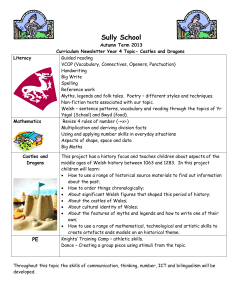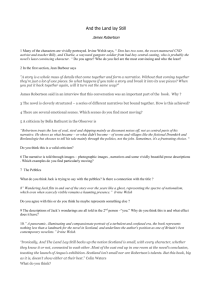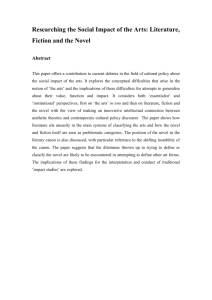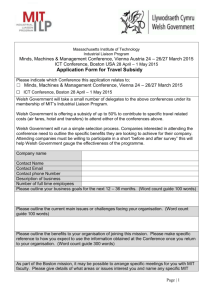Irvine Welsh: the Novels
advertisement
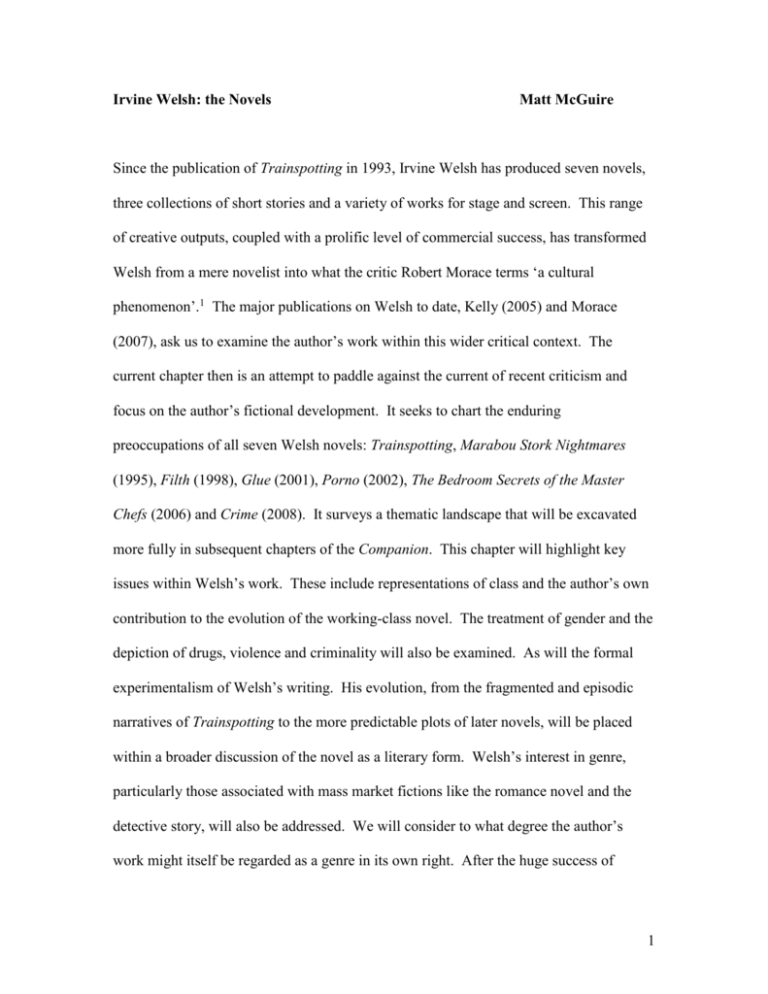
Irvine Welsh: the Novels Matt McGuire Since the publication of Trainspotting in 1993, Irvine Welsh has produced seven novels, three collections of short stories and a variety of works for stage and screen. This range of creative outputs, coupled with a prolific level of commercial success, has transformed Welsh from a mere novelist into what the critic Robert Morace terms ‘a cultural phenomenon’.1 The major publications on Welsh to date, Kelly (2005) and Morace (2007), ask us to examine the author’s work within this wider critical context. The current chapter then is an attempt to paddle against the current of recent criticism and focus on the author’s fictional development. It seeks to chart the enduring preoccupations of all seven Welsh novels: Trainspotting, Marabou Stork Nightmares (1995), Filth (1998), Glue (2001), Porno (2002), The Bedroom Secrets of the Master Chefs (2006) and Crime (2008). It surveys a thematic landscape that will be excavated more fully in subsequent chapters of the Companion. This chapter will highlight key issues within Welsh’s work. These include representations of class and the author’s own contribution to the evolution of the working-class novel. The treatment of gender and the depiction of drugs, violence and criminality will also be examined. As will the formal experimentalism of Welsh’s writing. His evolution, from the fragmented and episodic narratives of Trainspotting to the more predictable plots of later novels, will be placed within a broader discussion of the novel as a literary form. Welsh’s interest in genre, particularly those associated with mass market fictions like the romance novel and the detective story, will also be addressed. We will consider to what degree the author’s work might itself be regarded as a genre in its own right. After the huge success of 1 Trainspotting is Welsh merely writing to order, reproducing his own highly stylised form of pulp fiction? Trainspotting is a book that barely needs an introduction. Nevertheless, it is ironic to examine Welsh’s fiction by beginning with a text that early critics were reluctant to describe as a novel. For Michael Brockington it was ‘hard to call it a novel, more a ragged accretion of short stories’; Sarah Hemming referred to ‘a series of unrelated episodes’; and Lucy Hughes-Hallett described a work ‘broken up into fragments.’2 Such statements accord with Welsh’s own views about the anti-literary qualities of his work: ‘I don’t have any literary heroes at all […] I don’t take references from other writers, but from lyrics, from videos and soap operas and stuff. I try and keep as far away from “the classics” […] as possible.’3 This anti-literary pose will be picked up in due course. For now we can agree that the episodic and fragmented nature of Trainspotting is crucial to the type of experience it is attempting to depict. The junkies, misfits and schemers that populate the novel live a highly chaotic and unpredictable existence. Unlike the film, where Ewan MacGregor’s voiceover provides a sense of narrative continuity, the novel eschews such fixed anchor points. Less than half of the forty four, largely unrelated, episodes are told from Renton’s point of view. The rest are narrated by Sick Boy, Spud, Begbie, Tommy, Rentons’s brother, Nina and Kelly. Instead of the narrative progress of an individual character the novel presents us with a community of voices.4 Notions of community would of course come under acute attack with the rise of Thatcherism in the 1980s, the period in which the book itself is set. The decimation of heavy industry, the privatisation of public services and the liberalisation of the free-market were regarded by 2 many as a specific attack on working-class communities throughout Britain. As an ideology Thatcherism sought to discredit notions of class, arguing that the goal of society was to maximise economic efficiency. This was achieved by individuals being free to pursue their own selfish ends. This change in social values, the breakdown in community, pervades Trainspotting. In first chapter we learn that there are: ‘Nae friends in this game. Jist associates.’ (T 6) And when baby Dawn dies and Leslie needs a hit, Renton cooks up, admitting he will look after himself first: ‘that goes without saying.’ (T 56) Moreover, the heroin sub-culture of the 1980s is a world where sharing, as in the sharing of needles, could quite literally cost you your life. Welsh’s fiction explores the vacuum left behind by the disappearance of more traditional notions of class and community. What little narrative trajectory there is in Trainspotting sees Renton perform an act of rampant individualism. At the end of the novel he commits the ultimate betrayal. He steals from his friends, turns his back on his community and flees to Amsterdam. The novel’s conclusion is deeply pessimistic. In the post-Thatcherite world society cannot be improved by the actions of the individual. Instead we live a kind of economic Darwinism. The fittest survive by exploiting others and turning their weaknesses into our own competitive advantage. The lack of a stable vantage point mimics the experience of many characters in Trainspotting. On the socio-economic margins of society, their lives cannot be rendered by the cosy and predictable plots of bourgeois life. We witness heroin’s utter annihilation of all other narratives – work, family, sexual relationships – and its replacement with the terminal logic of drug addiction. The formal politics of the novel 3 then are intimately bound up with the book’s interrogation of class. Welsh is highly sceptical of the bourgeois nature of traditional literary fiction, describing it as a ‘middleclass plaything’.5 Trainspotting eschews many of the traits of the traditional realist novel, particularly its use of third person narrative. In doing so it aligns itself with the textual politics that underpin much recent working-class Scottish fiction.6 For the Glasgow writer James Kelman the formal politics of the realist novel are inherently elitist. The omniscient third person narrator assumes a position of authority over the text, interpreting, explaining and ultimately conferring significance upon the lives of individual characters. Trainspotting deliberately subverts such hierarchy. The characters themselves act as our guides to the world of the novel. If Welsh’s work continues certain traditions of earlier working-class fiction, it also marks something of a radical departure. Trainspotting offered an important corrective to the Glasgow bias – one that included George Friel, Archie Hind, William McIlvanney, Alasdair Gray and James Kelman – that had existed within Scottish working-class fiction. At one stage Renton wryly comments: ‘Ah’ve never met one Weedjie whae didnae think that they are the only genuinely suffering proletarians in Scotland.’ (T 191) Welsh’s fiction also signals a shift away from the depiction of lonely artists, busconductors and disaffected school teachers. His work focuses on a younger generation, characters that have never worked and in all likelihood will never work. It is their leisure time rather than their experience of work that his writing explores. There is also an important generational shift at work here. Whereas Kelman et al were publishing since the 1970s, Welsh did not make his literary debut until 1993. His work deals with a post-Thatcherite world, a place where, as New Labour would soon tell us, there are no alternatives to capitalism.7 The novel takes its title from 4 an episode in the disused Leith central station, a place that implicitly gestures toward an industrial past that has all but disappeared. The labour based society has been replaced by the ethics of consumerism. Trainspotting rarely depicts people working. Instead, through their use of heroin, these characters are enthralled to a form of conspicuous consumption, a cycle of behaviour that will eventually destroys them. The heroin hit recalls the endless deferment of pleasure indicative of contemporary culture. Like the consumer, the junkie is only ever temporarily satisfied. Before long he must return for another hit, another purchase, another moment of ever diminishing fulfilment. Renton’s rant – ‘Choose life. Choose mortgage payments; choose washing machines; choose cars…’ (T 187) – satirises the vacuous freedoms of modern consumer culture. Here happiness lies in the freedom to choose absolutely anything one wants. Such narratives of course conveniently neglect the fact that one must be able to afford these choices in the first place. Ironically of course, heroin addiction represents the nullification of choice. The addict is highly compromised in their ability to exercise free will and to choose alternative forms of behaviour. The depiction of drugs in Trainspotting is part of a general fascination for popular culture within Welsh’s writing. For Willy Maley: ‘Welsh’s influences, or effluences, range across contemporary film, music and television rather than resting on the [literary] canon.’8 This type of manoeuvre, shunning the literary in favour of the popular, pervades Trainspotting: the book opens with Renton entranced by a Jean-Claude Van Damme video; Sick Boy spends half his time talking to and impersonating an imaginary Sean Connery; and the novel itself is peppered with references to music (Iggy Pop, The Smiths 5 and The Clash) and football, particularly the highs and lows of being a Hibs fan. On a train journey to London Begbie illustrates the divide between high and low culture, between the literary and the non-literary, in his own inimitable style: ‘Wir supposed tae be doon here fir a fuckin laugh, no tae talk aboot fuckin books n aw that fuckin shite. See if it wis up tae me, ah’d git ivray fuckin book n pit thum on a great big fuckin pile n burn the fuckin loat.’ (T 116) What is at stake in these attempts by Welsh to situate his book as some form of anti-novel? We might begin by questioning the author’s attempts to downplay the literary qualities of his work. Episodic and fragmented narratives? Told from a variety of perspectives? And using indirect discourse to access characters’ inner worlds? These are the hall marks of modernist fiction such as James Joyce’s Ulysses (1922) or Virginia Woolf’s Mrs Dalloway (1925). In fact, Welsh’s fiction might be read alongside The Rise of the Novel (1957) Ian Watt’s account of the emergence of the novel as a literary form in the early eighteenth century.9 In the prose writing of Daniel Defoe Samuel Richardson and Henry Fielding the strict formal requirements of poetry gave way to a more casual form of writing. Through the novel literary language comes closer to an approximation to actual speech. Moreover, these early fictions were decried in certain quarters as signaling a lowering of literary standards, a democratisation of literature and a worrying intrusion of commercial life into the artistic domain of writing. All these issues pertain to Trainspotting. In denying any literary pretence, Welsh mimics his own wily Mark Renton who is characterised by his ability to code shift, to assume different voices and play to different galleries. The artifice of Welsh’s fiction can be found it its ability to entice both the world of urban, youth culture and that of the academic literary critic. When Welsh does focus on taboo subject matter – drugs, football violence, pornography 6 – he attempts to situate these phenomenon within their broader sociological context. Heroin is highly anti-social, an all consuming way of life that annihilates all other narratives. For Robert Morace: ‘[It is] a potent floating signifier of social pathology, political dependence, and consumer capitalism.’10 When subsequent novels feature drugs it is as ciphers within these highly politicised, ideological debates. The anti-social nature of heroin contrasts with a more mainstream drug culture in the 1990s. In 1996 Welsh published three novellas under the title Ecstasy. In one of these stories he compares the ecstasy pills of club culture with the wilful escapism of romance fiction. Getting ‘loved up’ and living for the weekend are read in terms of a temporary reprieve from the everyday boredom of work life. Later in Porno it is cocaine which is used to diagnose the unmitigated and aggressive selfishness of capitalist Britain. Whilst the film of Trainspotting focuses primarily on the issue of drugs, the novel offers a more nuanced and expansive interrogation of working-class culture in Scotland. The themes of sectarianism and racism, central to the book, barely feature in the film. In the novel the characters sing Irish rebel songs at Begbie’s New Year’s party, whilst Renton’s brother is killed serving as a British soldier in Northern Ireland. Trainspotting demonstrates the ambiguous relationship between Scottish history and narratives of colonialism. A complicity in the British imperial project exists alongside a wider sense of solidarity with other marginalised groups. Renton’s infamous tirade that ‘It’s shite being Scottish’ openly appropriates the rhetoric of postcolonial theory: ‘It’s nae good blamin it oan the English fir colonising us […]. They’re just wankers. We are colonised by wankers. We can’t even pick a decent, vibrant, healthy culture to be colonised by.’ (T 7 78) Scotland’s dual status, as both victim and persecutor in the British imperial adventure, is most fully developed in Welsh’s second novel Marabou Stork Nightmares. The book centres on Roy Strang, an Edinburgh scheme dweller who lies in a comatose state in hospital following an attempted suicide. This was Roy’s response to the unbearable guilt he suffered following his participation in the brutal gang rape of a young woman, Kirsty Chalmers. The narrative oscillates between the fantasy world of Roy’s imagination and his memories of growing up in Muirhouse, his temporary immigration to South Africa, and his experience as a football casual back in Edinburgh. The immigration episode of the novel juxtaposes the class politics of modern Scotland with the race discrimination of apartheid South Africa. Disempowered and marginalised at home, the Strangs learn that as whites in South Africa they assume a higher social status. This situation, however, is only temporary. The alcohol fuelled temper of Roy’s father eventually gets him in trouble. He is arrested and the family is deported back to Edinburgh and Muirhouse. Roy draws equivalence between his own experience of the scheme and the life of black South Africans under apartheid: ‘Edinburgh to me represented serfdom. I realised that it was exactly the same situation as Johannesburg; the only difference was that the Kaffirs were white and called schemies.’ (M 80) In separate articles Alan Freeman and Ellen-Raïssa Jackson along with Willy Maley question the suspicious ease with which Welsh’s fiction attempts to appropriate the suffering of one group to bolster the persecution felt by another.11 This deliberate comparison of class and race evokes James Kelman’s 1994 Booker Prize speech where he described his own fiction as belonging to ‘a literature of decolonization.’12 It also echoes Roddy Doyle’s novel The Commitments (1989) where a group of impoverished 8 kids from a Dublin estate form an American soul band, claiming that the working-class are ‘the niggers of Ireland.’13 We might also read this comparison in terms of a more general crisis within the Left. By the end of the twentieth century the language of class, at least in its traditional form, is regarded in many quarters to be theoretically bankrupt.14 If Welsh’s work deploys the discourse of race as a way of re-theorising class, it is also interested in how racism and other kinds of intolerance operate within working-class culture. Begbie, for example, is denigrated as someone who is: ‘[…] intae baseballbatting every fucker that’s different: pakis, poof, n what huv ye.’ (T 78) He represents the proto-typical hard man who, whilst openly castigating his friend’s heroin use, is nonetheless addicted to his own drug: violence. Trainspotting deconstructs the myth of the working-class hard man, depicting Begbie as a bullying wife-beater, indulged by his friends and someone whose reputation is born out of a psychotic disregard for others rather than any skill or courage as a fighter. Marabou Stork Nightmares develops Welsh’s interest in masculine violence and, similar to heroin, locate this themes within a broader sociological critique. As a child Roy’s father has him boxing his effeminate halfbrother Bernard. It is here that Roy’s sense of masculinity is intimately tied to notions of physical aggression: ‘TAKE THAT YA FUCKIN SAPPY BIG POOF.’ (M 29) We witness the seeds of Roy’s adult behaviour as a casual being sown in his childhood. The link between masculinity and violence is a learned response to life, one that is legitimated by a particular set of socio-cultural values. Later the monotony of Roy’s working life as a computer analyst is offset by the adrenalin rush of organised violence at the weekends. When exploring why young men partake in such behaviour Marabou Stork Nightmares 9 candidly reminds us of its entertainment value. We might recall that Trainspotting opens with Renton watching his Jean-Claude Van Damme video, anticipating ‘some serious swedging’. (T 3) In terms of a wider cultural context the action movies of the 1980s would be seceded in the 1990s with a number of highly stylised depictions of violence, including the films of Quentin Tarantino. Marabou Stork Nightmares might also be read in terms of the more specific questions about masculinity and violence examined in a book like Chuck Palahniuk’s Fight Club (1996). Welsh’s novel portrays football violence as a displacement activity. It is a misdirected form of retaliation, the angry outbursts of an abandoned generation of working-class men. At the end of the novel Roy meets his boss and has an epiphany about who the real target of his aggression should be: ‘these are the cunts we should be hurtin, no the boys wi knock fuck oot ay at the footba, no the birds we fuck aboot […] These cunts. Bit naw; we screw each other’s hooses when they’re fuck all in them, we terrorise oor ain people.’ (M 201) If racism and homophobia are the dark underbelly of working-class culture, so too is the misogyny that Welsh finds within this world. Begbie’s penchant for violence extends to his wife June who, like his friends, lives in fear of his fists. Toward the end of Trainspotting Sick Boy and Renton play a practical joke on their friend Kelly, telephoning the bar and asking for ‘Mark Hunt’. Kelly’s cries of ‘ANYBODY SEEN MARK HUNT’ are met with uproar from the all male clientele and Renton realises, too late, that this is ‘lynch mob laughter.’ (T 279) In Marabou Stork Nightmares this tension is graphically played out in the rape of Kirsty Chalmers by Roy and his gang. Characteristic of Welsh’s fiction, the novel does not spare the explicit details. The author 10 justifies this strategy as a way of deconstructing mainstream representations of sexual violence.15 However, for Evelyn Gillian there is a sense of collusion between Welsh’s treatment of rape and the kind of patriarchal values it attempts to condemn.16 Such comments echo the wider criticism of Welsh’s work by Elspeth Findlay. For Findlay the author’s novels are complicit in the kinds of elitism they ostensibly attempt to critique. What they provide is an essentially bourgeois audience with the opportunity to safely holiday in other people’s misery.17 Marabou Stork Nightmares exposes the patriarchal nature of the justice system. Kirsty is forced to publicly recount her ordeal and then has her own sexual morality questioned by the court, events that are described in terms of a second rape. However, Welsh’s feminist credentials have been questioned by a number of critics. When Kirsty is denied justice by the court system she visits the comatose Roy in hospitalised and exacts her own revenge by cutting off his penis. Female empowerment is represented in masculine terms, through the exercise of violence and the reciprocal violation of the male body. But as Berthold Schoene argues, this form of revenge sees Kirsty not escaping or transcending the codes of masculine society; instead her revenge can only take the form of an explicit and violent attack on male sexual identity.18 If Marabou Stork Nightmares diagnoses the ineffectiveness of the court system, Welsh’s third novel Filth turns its gaze on another state institution, the police. In contrast to the decentred nature of earlier fictions, Filth mimics the narrative logic of crime writing whereby the plot traditionally revolves around an outspoken detective figure and his attempts to solve a murder. In this case Detective Sergeant Bruce Robertson is on the 11 hunt for the killer of Efan Wurie, a journalist whose father is the ambassador for Ghana. As with many forms of crime writing, the plot exists as a loose framework upon which to hang the figure of the detective. Critic John Scagg’s describes the ‘Private I.’ of detective fiction as a form of ‘Private Eye’, one which grants the reader a unique perspective on the world of the text .19 In contrast to the quixotic Marlowe of Raymond Chandler or the stubbornly righteous Rebus of Ian Rankin, Bruce Robertson is an antihero, an accumulation of all that is most loathsome in Welsh’s earlier creations. Far from the enigmatic justice seeker, Robertson is a racist, misogynistic, homophobe. He combines a misanthropic personality with heavy drinking, drug taking and a ruthless desire to climb the career ladder within the police. Similar to Roy Strang in Marabou Stork Nightmares, Robertson is a character that it is difficult to spend time with. As the novel progresses we learn that, far from hunting Wurie’s killer, the detective is attempting a cover up as he in fact is the murderer. Unable to form bonds with family, friends or colleagues the novel ends with Robertson committing suicide. If Filth sees the development of more extravagant plots, the same could also be said about the novel’s form. Welsh attempts to develop, arguably with limited success, the kind of narrative experimentalism that defined his earlier fiction. Robertson’s first person narrative is sporadically interrupted by that of a tapeworm which, due to his unhealthy lifestyle, is slowly gestating in his stomach. The worm’s voice appears in speech bubbles over the top of the main narrative, gradually taking up more space as the book progresses. The tapeworm becomes the voice of Robertson’s conscience which, by the end of the novel, reveals his personal history and the events which moulded his 12 detestable character. Welsh’s sojourn into crime writing is indicative of his earlier fiction in that it is the sociological implications opened up by the genre he is particularly interested in. As Aaron Kelly argues: ‘Welsh makes subversive use of the detective thriller in Filth to turn the genre’s formal logic of pursuing crime towards a questioning of the very legitimacy of the police and the state.’20 In his forth novel Glue sees Welsh returns to familiar themes and motifs that characterised his debut novel Trainspotting. Like its predecessor the book focuses on the lives of several characters: Billy Birrel, Andrew Galloway or Gally, Carl Ewart and Terry Lawson. Again Glue also shares out narrative duties, refusing to present a singular or coherent perspective on the world. The title of the novel alludes to the question of social bonds and what it is that keeps individuals and communities together. Where Glue marks a significant departure is in terms of its historical scale. Whereas previous fiction presents characters in media res, thrown into existence and attempting to make sense the world, Glue offers snapshots of these lives over a period of four decades. Beginning in the 1970s it follows the four friends through childhood, adolescence and early manhood. For Aaron Kelly this change of narrative perspective is arguably born out of the author, now a famous writer, and his increased estrangement from the actual experience of the working-class community he attempts to write about.21 Welsh followed Glue with with Porno, a novel which saw the return of the Trainspotting cast including Renton, Sick Boy, Begbie, Spud and Diane. In the novel Sick Boy and Renton, enemies since the latter’s betrayal over the dope deal, return to 13 Leith after several years working in London and Amsterdam respectively. Porno then might be read as a book of homecoming, for both Welsh himself and his two most memorable protagonists. The Leith that Sick Boy and Renton return to is markedly different from the one they left. Like so many post-industrial areas, it is subject to a process of gentrification. For Sick Boy the place is turning ‘from Jakey Central to new Leith café society.’ (P 45) The characters in Porno show varying degrees of adaptability to the changing nature of their beloved port. We recall the court scene in Trainspotting where Renton’s ability to adapt to the situation that ensured his suspended sentence. In contrast Spud, unable to act the part of the contrite defendant, received a custodial sentence. Similarly in Porno it is Renton and Sick Boy who are most able turn the postindustrial landscape to their advantage. Spud, battling to stay clean and Begbie, freshly released from prison, read the changes as just another form of the world’s inherent instability. We might also read the heightened commercialism of this new Leith in terms of Welsh’s own decision to return to these characters. In one interview the author comments on the potential to make ‘mega-bucks’ from this his own ‘minor Harry Potter franchise.’22 This willingness to resuscitate characters, scenarios and settings aligns Welsh’s later fiction with other genres of fiction such as the detective story, the romance novel or the thriller. Porno also features Glue’s Terry Lawson who has begun to organise sex parties after closing time in the backroom of a Leith pub. Having bought his aunt’s bar, The Port Sunshine, Sick Boy offers to rent a space to Lawson and his friends. When one of these parties is inadvertently filmed by the security cameras, Sick Boy seizes on the notion of a 14 pornographic film as a lucrative and highly enjoyable way of making money. Having learned about Renton’s whereabouts in Amsterdam, Sick Boy visits him and persuades him to put in some money as payback for his earlier betrayal in Trainspotting. In writing about the sex industry Porno illustrates Welsh’s willingness to take contemporary fiction into new territory. Having said this, pornography itself is heavily implicated in notions of voyeurism and spectator pleasure and as such echoes earlier criticisms about the exploitative nature of Welsh’s fiction. Like the evolution of drugs in Welsh’s writing, Porno diagnoses a wider cultural shift in the 1990s regarding mainstream representations of women. The emergence of men’s magazines such as Loaded and FHM during this period saw highly sexualised images of women become an increasing part of everyday culture. In keeping with earlier novels, Welsh examines pornography as the apotheosis of late capitalism and its commodification of all aspects of human experience. In Porno Nikki Fuller-Smith is a middle-class English student who, rejecting the pretentiousness of University life, becomes a sex worker and eventually writes and acts in Sick Boy’s film. Initially Nikki is presented as the kind of liberated, confident and sexually permissive woman who might so easily adorn the pages of Loaded. She believes she can redefine notions of female sexuality and its relationship to something as politically problematic as pornography. Eventually she concedes the impossibility of securing any meaningful form of empowerment from the scenario whereby a group of men leer at the public performing of sex. 15 Welsh’s sixth novel The Bedroom Secrets of the Master Chefs tells the story of two young characters, Danny Skinner and Brian Kibby, who both work as restaurant inspectors for the Edinburgh council. The novel plays with concepts of doubleness and duality familiar to readers of Scottish fiction as far back as James Hogg’s The Private Memoirs and Confessions of a Justified Sinner (1824) and Robert Louis Stevenson’s The Strange Case of Dr Jekyll and Mr Hyde (1886). Welsh’s characters are polar opposites in almost every way. From Leith, Skinner is an alcoholic binge drinker. He takes cocaine and spends his weekends running with local Hibs casuals. In contrast Kibby is a nerd. He is clean living, does not drink and spends his spare time hill walking with a local rambling club. Skinner’s broken background, he never knew his father, is juxtaposed with Kibby’s own domestic stability. Early in the novel the death of Kibby’s father sets up the books climactic revelation that Skinner and Kibby are in fact half brothers. As with earlier novels, Welsh is interested in extremes of behaviour. Taking its cue from the cult of the celebrity chef, the title of the novel refers to a book which Skinner himself reads during the novel. A hedonist’s bible, the book details overblown accounts of culinary and sexual excess, and acts as a guide to the overindulgence of contemporary society. With echoes of the tape worm in Filth, Bedroom Secrets illustrates Welsh’s tendencies toward the surreal and the fantastic. Spurred by his jealousy, Skinner somehow is able to wish all his hangovers onto Kibby who begins to suffer from the after affects of his rival’s excesses. The novel interrogates the hedonistic nature of contemporary culture and it false promise of consequence free living. The long term implications of our current lifestyles, both in terms of the environment and future public health, underpins the surreal narrative of The Bedroom Secrets of the Master Chefs. 16 Whilst Skinner attacks life with a reckless abandon, Kibby is eventually hospitalised and has to have emergency surgery on his liver. In contrast to the episodic nature of earlier Welsh novels, Bedroom Secrets offers a highly constructed narrative. The book’s fantastic storyline is interwoven with Skinner’s search to discover who his real father is. He believes that finding his father will explain why he has become the person he is today. When his journey takes him to San Francisco, Skinner realises that it is the environment at home is heavily implicated in his alcoholism: ‘But the pull, oh my God the fucking pull, aye, much stronger in dingy auld Edina than in sunny Cal-i-for-nigh-ay […] Every bar I pass containing a face: a memory, a story, and the fabric of a life. More than the alcohol I’m addicted to that way of life, that culture, those social relationships.’ (B 319) In Crime Welsh once again fleshes out a character that had featured in an earlier novel. Ray Lennox first appeared alongside Detective Sergeant Bruce Robertson in Filth. In Welsh’s seventh novel Lennox is on holiday in Miami with his fiancé Trudi. The holiday was designed to relieve stress following Lennox’s involvement in the Brittany Hamil case where a young Edinburgh girl had been abducted, sexually assaulted and murdered. Never one to shun the controversial, Welsh’s most recent novel explores paedophilia and the vulnerability of children within modern society. In terms of a barometer of contemporary culture the novel also draws on the huge media interest surrounding the real life abduction of Madeline McCann in the holiday resort of Praia da Luz in Portugal in 2007. Whilst in Miami Lennox, himself a recovering cocaine addict, goes on a drinking spree where he meets a woman named Robyn and her friend Starry, who take him home. At the party Lennox witnesses one of Robyn’s male friends attempt 17 to sexually assault her young daughter, Tianna. Having broken up the party he finds himself the next morning alone with the girl and responsible for her safety. When it turns out that the girls attacker is local police, Lennox finds himself exposing a paedophile ring. The tension mounts as the off duty cop attempts to return the girl to safety and restore some sense of moral order. The success of Lennox as the lone individual confronting the forces of evil sees Welsh’s fiction occupy radically different ground from where it began. For nationalist critics such tendencies arguably situate Welsh in a tradition of popular Scottish writing, one which includes the adventure stories of Robert Louis Stevenson, the detective fiction of Arthur Conan Doyle, and the international thrillers of John Buchan. The modes of popular fiction which adumbrate Welsh’s later writing provide a potent contrast to the deconstructive energies of his earlier work. Like the character of Mark Renton, the transformations of Welsh’s fiction have been decisive, dramatic and in the end, rarely free from controversy. 1 Robert Morace, Irvine Welsh (Basingstoke: Palgrave MacMillan, 2007), p.13. Michael Brockington, ‘Poisoned Haggis’, Vancouver Review (Fall/Winter 1995), www.sfu.ca/brocking/writing/phaggis.html (Aug 2003); Sarah Hemming, ‘Grim Wit in a Drug Wasteland’, Financial Times (21 Dec 1995), p.11; Lucy Hughes-Hallet, ‘Cruising For a Bruising’, Sunday Times (15 Aug 1993), p.6. 3 John Walsh, ‘The Not-so-shady past of Irvine Welsh’, The Independent, Weekend Section (15 Apr 1995), p.25. 4 Cairns Craig aligns Trainspotting with Lewis Grassic Gibbon’s Sunset Song (1932) in terms of their mutual interest in the voice of a disappearing coimmunity. See Cairns Craig, The Modern Scottish Novel: Narrative and the National Imagination (Edinburgh: Edinburgh University Press, 1999), p.97. 5 John Mulholland, ‘Acid Wit’, Guardian, G2T (30 Mar 1995), p.8. 6 For a full exposition of this thesis see Liam McIlvanney, ‘The Politics of Narrative in the Post-war Scottish Novel’ in Zachery Leader (ed), On Modern British Fiction (Oxford: Oxford University Press, 2002), pp.181-202. 2 18 7 Anthony Giddens, The Third Way: The Renewal of Social Democracy (Cambridge: Polity Press, 1998), p.43. 8 Willy Maley, ‘Subversion and squirrility in Irvine Welsh’s shorter fiction’ in Dermot Cavanagh and Tim Kirk (eds.), Subversion and Scurrility: Popular Discourse in Europe from 1500 to the Present (Aldershot: Ashgate, 2000), pp.190-204, p.192. 9 Ian Watt, The Rise of the Novel [1957] (London: Pimlico, 2000), p. 26, 53. 10 Robert Morace, Irvine Welsh (Basingstoke: Palgrave MacMillan, 2007), p.46. 11 Alan Freeman, ‘Ourselves as others: Marabou Stork Nightmares’, Edinburgh Review 95 (1996), pp. 135141; Ellen-Raïssa Jackson and Willy Maley, ‘Birds of a feather? A Postcolonial reading of Irvine Welsh’s Marabou Stork Nightmares’, Revista Canaria de Estudios Inglese 41 (2000), pp. 187-196. 12 James Kelman, ‘Elitist slurs are racism by another name’ Scotland on Sunday, 16 October 1994, Spectrum, p. 2. 13 Roddy Doyle, The Barrytown Trilogy: The Commitments, The Snapper and The Van (London: Minerva, 1993), p. 38. 14 See for example Stewart Hall, The Hard Road to Renewal: Thatcherism and the Crisis of the Left (London: verso, 1988). 15 Quoted in In Your Face. Irvine Welsh: Condemn More, Understand Less. BBC 2. Broadcast 27 Nov 1995. 16 In Your Face, ibid. 17 Elspeth Findlay, ‘The Bourgeois Values of Irvine Welsh’, Cencrastus 71 (2002), pp.5-7. 18 Berthold Schoene-Harwood, Writing Men: Literary Masculinities from Frankenstein to the New Man (Edinburgh: Edinburgh University Press, 2000), p.155-6. 19 John Scaggs, Crime Fiction (London: Routledge, 2005), p.60. 20 Aaron Kelly, Irvine Welsh (Manchester: Manchester University Press, 2005), p.153 21 Kelly, ibid, p.176. 22 Cited in Aaron Kelly, ‘Irvine Welsh in conversation with Aaron Kelly’, Edinburgh Review 113 (2004), pp.7-17, p.10. 19


